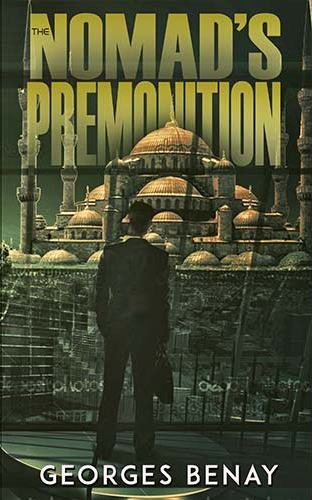 THE NOMAD’S PREMONITION by Georges Benay
THE NOMAD’S PREMONITION by Georges Benay
Eric Martin is desperate to forget his past, one that almost cost him his future. Three years ago, he discovered that the investment firm he worked for was run by a terrorist organization determined to get its hands on a predictive algorithm that promised unsurpassed success in global financial markets. Although he was able to stop the terrorists from getting the algorithm, he nearly sacrificed his life to do so.
Now working in Paris as deputy head of a bank’s internal security department, Eric notices a high-speed trader’s uncanny ability to predict extremely profitable trades. Even though there’s nothing overtly illegal about the activity, Eric can’t help but feel the trader’s success is more than just luck. Yet, no one believes him. Armed with just a handful of data and a powerful instinct, Eric searches for the mysterious trader on his own. He soon suspects that the same predictive algorithm he fought so hard to protect has fallen into the wrong hands.
Eric sets off to Istanbul to find answers promised to him by a less than forthcoming informant. He finds an unlikely ally in Interpol agent Stephanie Brulé, but is adamant about completing his mission alone. With Interpol determined to get him back to Paris and out of the way, the sudden appearances of his ex-lover, a boss he’s not sure he can trust, and a terrorist who always seems one step ahead, Eric’s quest for justice is hampered at every turn.
When the trader’s accomplices detect his presence in Istanbul, Eric finds himself visiting the underground cities of Cappadocia—with gun-toting terrorists as his travel guides.
Will Eric finally put an end, once and for all, to the nightmare that began when he hastily accepted a job that was too good to be true? Or will his need for revenge and justice lead him deeper into a dangerous world he cannot escape?
CHAPTER ONE……………………….
ARIS, France Eric Martin’s face tightened, then broke into a deep frown. He immediately recognized the signs the moment the data first appeared on the screen of his computer. The mysterious trader was back in the market. It should not have come as a surprise, but it did somehow. He had hoped that the trader had simply gone away—just moved on without a trace like an unresolved crime no one cared about anymore. But, that was not going to happen because the trader was akin to a bad virus that had a stranglehold on your computer. Except that in this case, it was Eric who was hooked. He watched the deal flash across the monitor: a long series of numbers in evenly spaced columns marching along his giant LED monitor at lightning speed. A fraction of a second later another trade popped up, followed by a third, and then a fourth.
Row after row the powerful computer spewed data in the blink of an eye across the length of the display monitor. There was barely enough time to transmit one transaction before the next one started to kick in. It went on for several minutes, and when it ended, three full screens were covered from top to bottom with enough figures and records to fill an entire order book. There was nothing unusual about these buy-and-sell trades. Neither the speed of their executions, nor the size of the transactions, and certainly nothing about the counterparties were particularly noteworthy. Yet, Eric had a visceral reaction the moment the trades appeared in rapid succession on his computer. He stared a moment longer at the large screen, waiting for more data to pop up. When none showed, he swiveled his chair around and glanced at the top of his office desk. He grabbed the top printout of a huge stack of documents blanketed with computer generated facts and numbers, and closely examined the long list of figures. Line upon line, records of stock exchange transactions populated the long printout. The amount, time, and date of the trades were printed next to each buy and sell deal. The name of the counterparty—in all cases an anonymous numbered company—appeared in bold letters across the page. What troubled Eric was not the sheer volume or frequency of the transactions that had been recorded over the past couple of months by some anonymous trader.
That the trader had been very active of late was not significant in itself. After all, the bank’s stocks had been flagged on every trading room around the globe since the start of the eurozone debacle. No. Something else about the trading patterns he had observed so many times before did not feel right. There were too many coincidences. Too many improbable trades and too many good market calls. What was really going on? He could sense the threat but could not explain it. And if this was not maddening enough, he could not get rid of the nagging feeling that someone was toying with him. He was still deep in thought when the sharp ring tone of the phone startled him. He inhaled a deep breath, stared at the receiver for a second or two, and finally picked it up on the third ring. The booming voice of his boss, Alain Lepetit, reverberated in the room. “Ah, good, you’re still in the office.” “Yes, Alain. What can I do for you?’’ Eric replied curtly. “Oh, I see you’re having a bad day. Your mysterious trader is at it again?” Eric ignored his boss’s sarcastic remark. He was running out of patience with him, particularly when the issue of the trader arose. They had discussed his suspicions over and over again, and each time Alain Lepetit had dismissed his theories as pure speculation, conjecture, or plain nonsense. This time, Eric was reaching his boiling point, and he struggled with his tone. “Alain, we really need to talk.” A silent pause at the other end of the line. Eric squeezed the receiver, expecting to hear more counter-arguments, reasons for dropping the case, or threats to fire him if he did not obey his boss. To his surprise, he heard none of these things. Instead, Alain Lepetit took an unexpected tack. “OK let’s mull over what’s bothering you at dinner tonight. I’m heading for the coast on the TGV. I should arrive at half past seven this evening, why don’t you join us, at say eight o’clock. Will that work for you? Chantal misses you, you know. She asked me to tell you that she is preparing your very favorite meal—roast lamb and couscous.” At the mention of Chantal, Eric pushed his dark thoughts away. “Please thank Chantal for me. And tell her that this is the best offer I have received in years.” The smile quickly vanished from his face soon after he hung up. He glanced at his reflection on the computer screen. What he saw was the face of a man torn by his past, one that had nearly cost him his life.
* * *
The last trades captured by the bank’s state-of-the-art global tracking system had fired up Eric even more. Was he blinded by the echoes of his previous dreadful experience, or was his judgment clouded by his hyperactive imagination? He struggled with that thought for a long time, not knowing where to turn for an answer. He was well aware of the high-speed trading systems in which computer-driven trades were made in fractions of a second. Armed with powerful algorithms, or “algos” as they were called in the industry, investment banks, hedge funds, and other securities firms could execute millions of trades in rapid-fire, buy-and-sell orders while simultaneously scanning for other opportunities in the capital and equity markets across the globe. They could spot trends across industries, public and private sectors, commodities, and currency exchange rates before the regular investors had time to blink. The high-speed, high-frequency traders always aimed at exploiting tiny price discrepancies, moving in and out in mere milliseconds, thereby rapidly reaping huge profits without leaving a trace. Rarely would they commit their firms’ funds to remain invested for any length of time. But this trader showed a very odd investment behavior. He often acted like one of those high-frequency specialists, in and out of the market in a nanosecond. The trade volumes were never excessively high, however, and the frequencies of the trades were not remarkable either. A low-grade trader with perhaps a below average investment risk limit, Eric thought the first time he had spotted the activities of this mysterious trader. And then once in a while, for no apparent reason, the trader would sit on an investment for weeks at a time, sometimes even longer. The amounts of the hold investments varied, but were never exceptionally large, just like his other high-speed transactions. At times, he would sell the entire hold in one trade; at other times he would scatter the sale over several small tickets at irregular intervals. There was nothing predictable about this trader’s behavior. Except for one thing—his market calls were nearly infallible. Eric had done a statistical analysis on the trader’s transactions. The results were incredible. The trader just seemed to have a knack for making the right market decisions most of the time. The correlation was even higher for his hold investments. Seven to eight times out of ten his buy-and-sell timings were right on, always managing to reap a nice profit. At first, Eric thought he was dealing with either a very smart market analyst or a very lucky one. But the predictive accuracies of the trades proved far too consistent to believe that smarts or luck alone had anything to do with it. The trader must somehow have access to privileged information—an insider perhaps, he reasoned. But in the end, he sensed something else was at play, and he did not like at all the implications.
The more Eric pondered the question, the more he felt a tightness rising from deep inside his chest. Eric was known for his logical, systematic, and thorough approach to problem solving. He had always relied on getting all the facts before making a decision. Every problem would be dissected between need-to-know and must-know data and information. He would research in depth every issue ad nauseam, consult and discuss the matter with every specialist he could get his hands on, and then he would act swiftly and decisively. That had made him a successful investment banker in his earlier life. But not anymore. Not since the terror he had experienced in Casablanca.
Out of the ashes of that horrific experience he had learned to trust his instincts even if he could not rationally explain them. He now paid a lot more attention to his gut feelings—even if sometimes they defied common sense. The data was pointing in one direction, but his intuition was telling him something quite different. And by now his guts were blaring all kinds of warning signals at him. He quickly glanced around his office, looking for something or someone to calm him down. He often felt that way when memories of what happened in Casablanca began pouring out of his subconscious mind. Although more than three years had passed since his whole world came crashing down on him, his mental state was still fragile. Time had not done its job. He had not healed, and all kinds of raw emotions still brewed inside him.
* * *
Eric rose from his chair, no longer able to suppress his dark thoughts. He stood in the middle of the office, forced himself to breathe normally, and took stock of his surroundings. It was not much of an office by North American standards, but this was Paris after all. He now lived and worked in the old world where space was at a premium. Nonetheless, he cherished the privacy his small office afforded him, even if his current seniority status at the bank did not justify him having such a privilege. He owed this benefit to his job function.
As Director, Global Security and Internal Control (“GSIC”), at Banque du Commerce headquarters, he often came across extremely sensitive and very confidential files. Thus, the office was not only his sanctuary, it was also in a way a kind of Fort Knox, protected twenty-four hours a day, seven days a week by security guards posted outside at both ends of the hallway. He walked to the window and stared blankly at the grey expanse in front of him. His favorite view was all but gone. The clouds hung low and heavy above the city, masking one of the most beautiful skylines in the world. Nice and the Côte d’Azur were a mere hour and a half flight from Paris, and he needed a break like never before. One last look at the city, enveloped in faint darkness, convinced him to pack up and lock his office in a hurry. He scribbled two names on a yellow sticker, placed it on the top page of the document he had just finished reviewing, and shoved the trader’s data in the safe. He then picked up the phone and asked to speak to Bartolli at Interpol. Their conversation was short and polite. Eric did most of the talking. Bartolli hummed a few times and asked all the right questions.
He was as professional as they come, but Eric noticed a distinct lack of enthusiasm. Financial crimes were hard to prove, assuming you could even show that a crime had been committed. I’m afraid our friendship is not going to be enough to get him on board, Eric thought as he stared at the bare walls of his office.
You can purchase THE NOMAD’S PREMONITION at:
Amazon
About the Author:
 Georges Benay is a former international banker who is now working as a Toronto-based writer and award-winning photographer. He is the author of two novels, including Nomad on the Run, and a collection of short stories. His award winning pictures have been featured in several magazines and book covers.
Georges Benay is a former international banker who is now working as a Toronto-based writer and award-winning photographer. He is the author of two novels, including Nomad on the Run, and a collection of short stories. His award winning pictures have been featured in several magazines and book covers.
Visit his websites at: www.georgesbenay.com and www.georgesbenayphotoart.fototime.com






